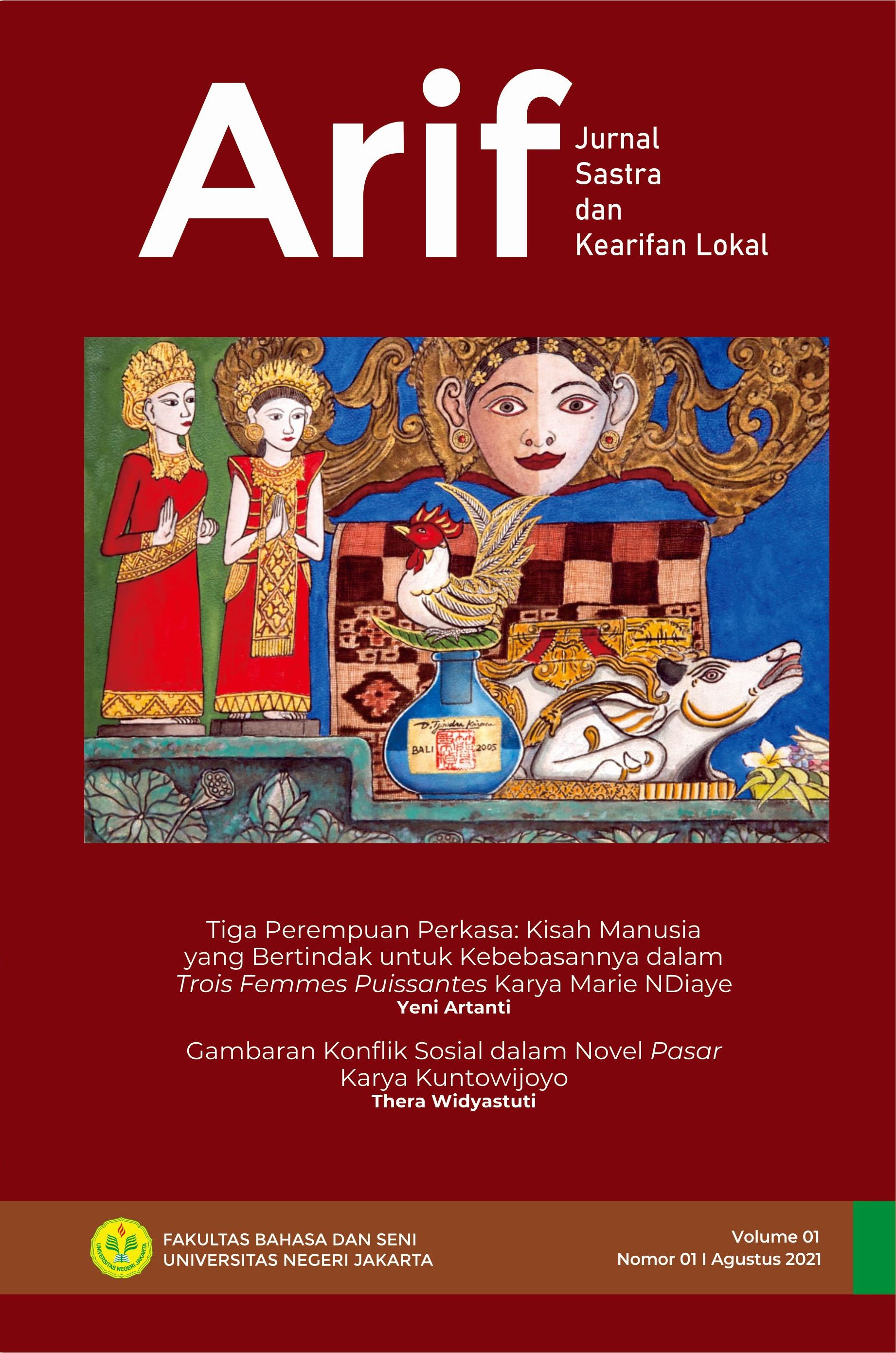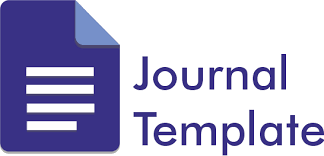Autoethnographic Studies on Traditional Knowledge of Fishermen Communities on Mandangin Island, Indonesia
DOI:
https://doi.org/10.21009/Arif.011.04Keywords:
autoetnografi, Mandangin, masyarakat nelayan, pengetahuan tradisionalAbstract
Studi mengenai pengetahuan lokal, saat ini marak seiring dengan kesadaran masyarakat mengenai pentingnya penggalian dan pelestarian lokalitas. Penelitian ini bertujuan menggali pengetahuan tradisional masyarakat nelayan Pulau Mandangin, Indonesia. Pulau Mandangin merupakan salah satu pulau kecil di wilayah Indonesia. Penelitian ini menggunakan metode kualitatif dengan pendekatan autoetnografi. Teknik pengumpulan data dilakukan dengan wawancara, pencatatan, dan observasi autoetnografi. Adapun teknik penentuan informan mengacu pada Spradley, yaitu (1) pemahaman budaya, (2) pemahaman budaya yang tidak diketahui, (3) pemahaman non-analitis-interpretatif, (4) ketersediaan penuh waktu, dan (5) masyarakat adat. Hasil penelitian menunjukkan bahwa masyarakat nelayan Pulau Mandangin menganut pengetahuan tradisional terkait pembuatan rumah tadah hujan, pembuatan sumur tradisional, pembuatan perahu tradisional, dan penangkapan ikan secara tradisional.
References
Ahmadi, A. (2015). Perempuan dalam Sastra Lisan Pulau Raas: Kajian Gender. J. Bhs. dan Seni, 43(1), 57–65.
Ahmadi, A. (2021). Ethical identification of Muslim women on Mandangin Island: An ethnographic study. Masyarakat, Kebudayaan dan Politik, 34(1), 51. https://doi.org/10.20473/mkp.v34i12021.51-57.
Ahmadi, A., & Yulianto, B. (2019). Indonesian Literature and Traditional Knowledge: Interdisciplinary Perspective. International Journal of Multicultural and Multireligious Understanding, 6(4), 102. https://doi.org/10.18415/ijmmu.v6i4.950.
Anoegrajekti, N., Hasan, M., Macaryus, S., Inawati, E., Suddhono, K., & Yulitin Sungkowati. (2020). Traditional Art and Cultural Inheritance as Dynamic Development of Gandrung Performing Art. International Journal of Psychococial Rehabilitation, 24(8), 13817–13828. https://doi.org/10.37200/IJPR/V24I8/PR281366
Ardakani, M. A., & Emadi, M. H. (2008). Traditional knowledge of iranian farmers on biological pest management. Indian Journal of Traditional Knowledge, 7(4), 676–678.
Aung Si. (n.d.). The Traditional Ecological Knowledge of the Solega: A Linguistic Perspective. New York: Springer US.
Cann, C. N., & DeMeulenaere, E. J. (2012). Critical Co-Constructed Autoethnography. Cultural Studies ↔ Critical Methodologies, 12(2), 146–158. https://doi.org/10.1177/1532708611435214.
Chakravarty, R., & Mahajan, P. (2010). Preserving traditional knowledge: Initiatives in India. IFLA Journal, 36(4), 294–299. https://doi.org/10.1177/0340035210388246.
Clandinin, D., & Connely, F. (1994). Personal Experience Methods. In Norman K. Denzin & Yvonna S. Lincon (Eds.). Handbook of Qualitative Research. London: Sage.
Creswell, J. W., & Creswell, J. D. (2020). Research Design: Qualitative, Quantitative, and Mixed Methods Approaches. Thousand Oaks, California: Thousand Oaks, California: SAGE Publications.
Daigger, G. T. (2009). Evolving Urban Water and Residuals Management Paradigms: Water Reclamation and Reuse, Decentralization, and Resource Recovery. Water Environment Research, 81(8), 809–823. https://doi.org/https://doi.org/10.2175/106143009X425898.
Decuypere, M. (2020). Visual Network Analysis: a qualitative method for researching sociomaterial practice. Qualitative Research, 20(1), 73–90. https://doi.org/10.1177/1468794118816613.
Geertz, C. (2003). Local knowledge. London: Fontana Press.
Göltenboth, F. (2006). Ecology of insular Southeast Asia: the Indonesian Archipelago. Amsterdam; Oxford: Elsevier.
Gómez-Baggethun, E., Corbera, E., & Reyes-García, V. (n.d.). Traditional Ecological Knowledge and Global Environmental Change: Research findings and policy implications. Ecology and Society, 18(4). https://doi.org/10.5751/ES-06288-180472.
Hansen, S. A., & Van Fleet, J. W. (2003). Traditional Knowledge and Intellectual Property. New York: AAAS.
Latulippe, N. (2015). Situating the Work: A typology of traditional knowledge literature. AlterNative: An International Journal of Indigenous Peoples, 11(2), 118–131. https://doi.org/10.1177/117718011501100203.
Lohman, D. J., De Bruyn, M., Page, T., Von Rintelen, K., Hall, R., Ng, P. K. L., … Von Rintelen, T. (2011). Beyond Wallaces line: Genes and biology inform historical biogeographical insights in the Indo-Australian archipelago. Annual Review of Ecology, Evolution, and Systematics, 42(December). https://doi.org/10.1146/annurev-ecolsys-102710-145001.
Martin, F., Cahill, A., Wright, E., & Stoianoff, N. (2019). An international approach to establishing a competent authority to manage and protect traditional knowledge. Alternative Law Journal, 44(1), 48–55. https://doi.org/10.1177/1037969X18815254
Menzies, C.R. (2006). Traditional Ecological Knowledge and Natural Resource Management. London: University of Nebraska Press.
Michalopoulos, S. (2012). The Origins of Ethnolinguistic Diversity. American Economic Review, 102(4), 1508–1539. https://doi.org/10.1257/aer.102.4.1508.
Nalau, J., Becken, S., Noakes, S., & Mackey, B. (2017). Mapping tourism stakeholders’ weather and climate information-seeking behavior in Fiji. Weather, Climate, and Society, 9(3), 377–391. https://doi.org/10.1175/WCAS-D-16-0078.1.
Phillips, F.-K. (2016). Intellectual Property Rights in Traditional Knowledge: Enabler of Sustainable Development. Utrecht Journal of International and European Law, 32(83), 1–18. https://doi.org/10.5334/ujiel.283.
Popova, U. (2013). Conservation, Traditional Knowledge, and Indigenous Peoples. American Behavioral Scientist, 58(1), 197–214. https://doi.org/10.1177/0002764213495043.
Rahaman, M. R. (2015). Protection of traditional knowledge and traditional cultural expressions in Bangladesh. Journal of Intellectual Property Rights, 20(3), 164–171.
Sengupta, N. (2019). Traditional knowledge in modern India: preservation, promotion, ethical access and benefit sharing mechanisms. Retrieved from http://search.ebscohost.com/login.aspx?direct=true&scope=site&db=nlebk&db=nlabk&AN=1905729.
Spradley, J. P. (1979). The ethnographic interview. New York: Holt, Rinehart and Winston.
Tumonggor, M. K., Karafet, T. M., Hallmark, B., Lansing, J. S., Sudoyo, H., Hammer, M. F., & Cox, M. P. (2013). The Indonesian archipelago: An ancient genetic highway linking Asia and the Pacific. Journal of Human Genetics, 58(3), 165–173. https://doi.org/10.1038/jhg.2012.154.
Wall, S. (2006). An Autoethnography on Learning About Autoethnography. International Journal of Qualitative Methods, 5(2), 146–160. https://doi.org/10.1177/160940690600500205.
Zhang, S. C., Lin, S., Shen, A., Chen, H., Wang, F., & Huai, H. Y. (2016). Traditional knowledge on “Luchai” [Phragmites australis (Cav.) Trin. Ex steud. And Arundo donax L.] And their dynamics through urbanization in Yangzhou area, East China. Indian Journal of Traditional Knowledge, 15(4), 580–586.









